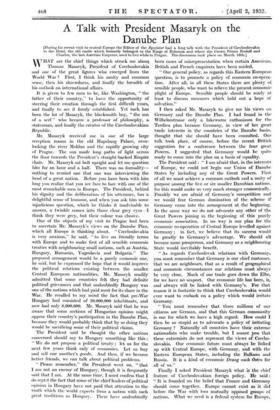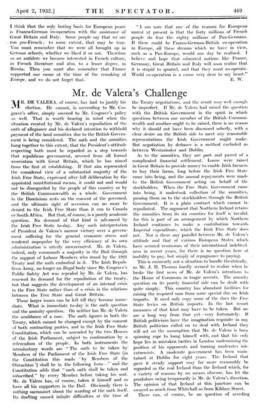A Talk with President Masaryk on the Danube Plan
[During his recent visit to central Europe the Editor of the Spectator had a long talk with the President of Czechoslovakia in the Brad, the old castle which formerly belonged to the Kings of Bohemia and where the Crown Prince Rudolf and Charles, the last Austrian Emperor, used to live while in Prague. The dismission took place on March 10th.] ]HAT are the chief things which struck me about Thomas Masaryk, President of Czechoslovakia and one of the great figures who emerged from the World War ? First, I think his sanity and common sense, then his shrewdness, and finally the breadth of his outlook on international affairs.
It is given to few men to be, like Washington, " the father of their country," to have the opportunity of steering their creation through the first difficult years, and finally to see it firmly established. Yet such has been the lot of Masaryk, the blacksmith boy, " the son of a serf " who became a professor of philosophy, a statesman, and finally the creator of the Czechoslovakian Republic.
Mr. Masaryk received me in one of the large reception rooms in the old Hapsburg Palace, over- looking the river Moldau and the rapidly growing city of Prague. The sun made long paths of light across the floor towards the President's straight-backed Empire chair. Mr. Masaryk sat bolt upright and let me question him for an hour and a half. There was no formality— nothing to remind one that one was interviewing the head of a great nation. Before you have been with him long you realize that you are face to face with one of the most remarkable men in Europe. The President, behind his dignity and the deliberation of his utterance, has a delightful sense of humour, and when you ask him some injudicious question, which he thinks it inadvisable to answer, a twinkle comes into those clear grey eyes—I think they were grey, but their colour was elusive.
One of the objects of my visit to Prague had been to ascertain Mr. Masaryk's views on the Danube Plan, which all Europe is thinking about. " Czechoslovakia is very anxious," he said, " to live on friendly terms with Europe and to make first of all sensible economic treaties with neighbouring small nations, such as Austria, Hungary, Rumania, Yugoslavia and Bulgaria." The proposed arrangement would be a purely economic one, he said, but he expressed the hope that it would improve the political relations existing between the smaller Central European nationalities. Mr. Masaryk readily admitted that some countries felt they had definite political grievances and that undoubtedly Hungary was one of the nations which had paid most for its share in the War. He recalled to my mind the fact that pre-War Hungary had consisted of 20,000,000 inhabitants, and now had only 8,000,000. Mr. Masaryk said that he was aware that sonic sections of Hungarian opinion might oppose their country's participation in the Danube Plan, because they would probably think that by so doing they would be sacrificing some of their political claims.
The President said he thought the other nations concerned should say to Hungary something like this : " We do not propose a political treaty ; let us for the next few years think only of economies. Let us buy and sell one another's goods. And then, if we become better friends, we can talk about political problems.
" Please remember," the President went on, " that I am not an enemy of Hungary, though it is frequently said that I am. At the same time, I must confess that I do regrat the fact that some of the chief leaders of political opinion in Hungary have not paid that attention to the truth which the world expects from a nation with such great traditions as Hungary. , There have undoubtedly been cases of misrepresentation when certain American, British and French enquirers have been misled.
" Our general policy, as regards this Eastern European. question, is to promote a policy of economic co-opera- tion. After all, in all these States there are plenty of sensible people, who want to relieve the present economic plight of Europe. Sensible people should be ready at least to discuss measures which hold out a hope of salvation."
I then asked Mr. Masaryk to give me his views on Germany and the Danube Plan. I had found in the Wilhelmstrasse only a lukewarm enthusiasm for the Tardieu plan because Germany, in view of her great trade interests in the countries of the Danube basin, thought that she should have been consulted. Our talk took place, of course, before the recent British suggestion for a conference between the four great Powers. I suggested that Germany would be quite ready to come into the plan on a basis of equality.
The President said : " I am afraid that, in the interests of Europe, we could not begin our Union of Danube States by including any of the Great Powers. First of all we must achieve a common outlook and a unity of purpose among the five or six smaller Danubian nations, for this would make us very much stronger economically. Frankly we arc afraid of Germany's competition and we would fear German domination of the scheme if Germany came into the arrangement at the beginning. In the same way we do not advocate any other of the Great Powers joining in the beginning of this purely economic association. In no way is our plan for the economic co-operation of Central Europe levelled against Germany ; in fact, we believe that its success would be greatly to Germany's advantage. We should all become more prosperous, and Germany as a neighbouring State would inevitably benefit.
" As regards Czechoslovak relations with Germany, you roust remember that Germany is our chief customer, that we are neighbours, that as a result of geographical and economic circumstances our relations must always be very close. Much of our trade goes down the Elbe, for we have no seaport. Our economic life has been, is, and always will be linked with Germany's. For that reason it is fantastic to think that Czechoslovakia would ever want to embark on a policy which would irritate Germany.
" You must remember that three millions of our citizens are German, and that this German community is one for which we have a high regard. How could I then be so stupid as to advocate a policy of irritating Germany? Naturally all countries have their extreme nationalists who make trouble, but I assure you that these extremists do not represent the views of Czechci- slovakia. Our economic future must always be linked up with Central Europe, with Germany, and with the Eastern European States, including the Balkans and Russia. It is a kind of economic Drang wick Osten for all of us."
Finally I asked President Masaryk what is the chief feature of Czechoslovakian foreign policy. He said : " It is founded on the belief that France and Germany should come together. Europe cannot exist as it did befOre the War with two mutually opposed 'groupS of nations. What we need is a federal system for EnroPe, I think that the only lasting basis for European peace is Franco-German co-operation with the assistance of Great Britain and Italy. Sonic people say that we are too pro-French ; to some extent, that may be true. You must remember that we were all brought up in German schools, whether we liked it or not. Therefore as an antidote we became interested in French culture, in French literature and also, to a lesser degree, iu Russia. Then you must also remember that France supported our cause at the time of the remaking of Europe, and we do not forget that. • " I am sure that one of the reasons for European unrest at present is that the forty millions of French people do fear the eighty millions of Pan-Germans. If there could be Franco-Gentum-British co-operation in Europe, all these dreams which we have in view, such as a Pan-Europe, would one day be realized. I believe and hope that educated nations like France, Germany, Great Britain and Italy will soon realize that it is stupid to quarrel, and that they must co-operate. World co-operation is a cause very dear to my heart."
E. W.

































 Previous page
Previous page